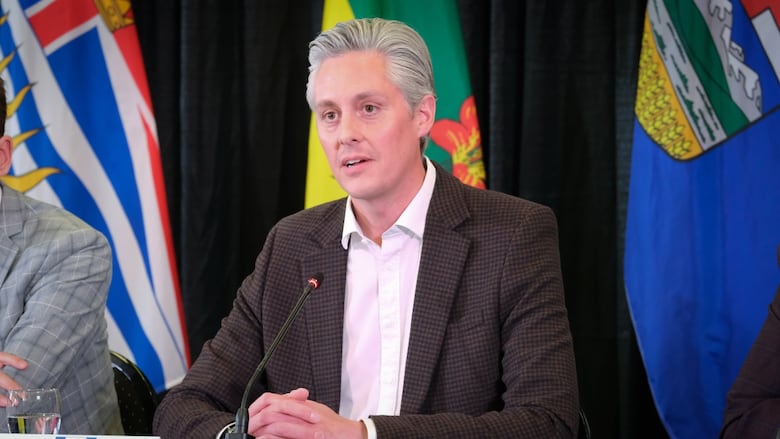Ottawa's major projects law won't affect the N.W.T. much, premier says
'For the most part there will be no effect by Bill C-5 in the Northwest Territories,' said R.J. Simpson

N.W.T. Premier R.J. Simpson says he expects Bill C-5, passed into law last month as the federal Building Canada Act, to have a limited effect in the territory.
Simpson says the territory's resource regime implements modern treaties that can't be easily sidestepped without consultation.
"That is not modified by Bill C-5, and for the most part there will be no effect by Bill C-5 in the Northwest Territories," he said.
The major projects legislation contains a list of federal acts that can be "overridden or modified," but the Mackenzie Valley Resources Management Act is not one of them, according to Simpson. It's a federal piece of legislation, a modern treaty document, and it's constitutionally protected, he said.
"It's not the kind of thing that the federal government can just ignore or change on a whim," he said.
However, the Inuvialuit region is an outlier, where the new federal act's effects are still being determined, said Simpson.
First Nations leaders met Prime Minister Mark Carney in Ottawa last week for a summit on the Building Canada Act, which allows cabinet to expedite project approvals and bypass environmental laws. Later this week, Carney will be in Inuvik, N.W.T., meeting with Inuit to talk about how the legislation can be implemented consistent with Inuit land claims agreements and in partnership with Inuit.

The bill became law on June 26 and is intended to improve Canada's economic position in the face of U.S. President Donald Trump's squeeze on trade relations.
With growing federal interest in Northern projects, Simpson said N.W.T. residents need to find a way to build a road to the Arctic Ocean, and move ahead on the Taltson hydro expansion project, and the Mackenzie Valley Highway project.
"At this point, we are the only ones who are going to be standing in our way," he said.
Asked whether the new legislation might drive developers toward more deregulated environments in the provinces, Simpson said N.W.T. has not received the same level of investment as the rest of Canada, over generations.
"It shows in the strength of our economy and the diversity of our economy," he said.
'We are not against development'
Dene National Chief George Mackenzie is among several leaders who met with Carney last Wednesday and Thursday.
Mackenzie says First Nations in the N.W.T. want ownership stakes in the projects Ottawa deems to be in the national interest and he expressed optimism that the prime minister will rise to the task.
"We are not against development, so that is very clear ... The question is, what does this word 'national interest' mean? That word 'national interest' makes us nervous," said Mackenzie.
"If these projects are gonna go ahead, the treaty people — the treaty holders, Dene Nation as a whole — has to take an equity position and be the owners of those projects," he said.

Dehcho Grand Chief Herb Norwegian said the Dehcho region contains immense riches that could meet Canada's demand for critical minerals, but if Canada wants to extract resources from areas currently under interim land withdrawals, it needs to get First Nations' consent, he said.
"You want to fast track your access? Well, let's fast track negotiations," Norwegian said.
With a northerner — N.W.T. MP Rebecca Alty — now the minister of Crown-Indigenous Relations and Northern Affairs Canada, Norwegian expects movement on the Deh Cho final agreement.
In a scrum Thursday, Alty said "national interest projects" are those which "advance the interests of Indigenous peoples," and that "we can't advance every project."
N.W.T. can be example, premier says
Simpson said that despite the limited impact the new federal legislation will have in the N.W.T., he wants the territory's nation-building projects noted and paid for, especially the Arctic security corridor to bring telecommunications and energy infrastructure from the North Slave region to the Northwest Passage.
He said Alberta Premier Danielle Smith, whose government is determined to bring its oil to international markets, is also supportive of the security corridor.
The N.W.T.'s environment minister is still in talks with Alberta about water and potential downstream impacts of oil and gas expansion, he said.
"We're affected by everything that they do that comes downstream, but we also have a good working relationship with them," he said.
Simpson says other regions may be looking to the N.W.T. as an example of how to uphold and implement modern treaties through a streamlined environmental assessment process, and seek Indigenous ownership behind future projects.
"My preference is that we have Indigenous proponents, Indigenous companies and development corps., actually doing that work so there's maximum benefit to Indigenous peoples," he said.

